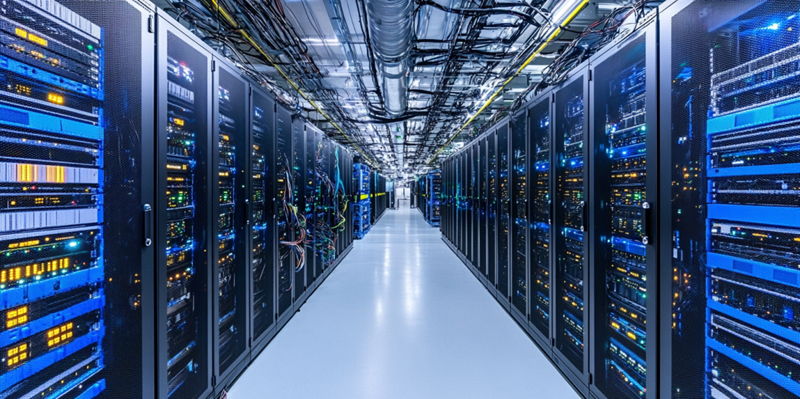Italy is making headlines as a burgeoning hub for data centers and digital innovation, attracting massive investments from multinational corporations looking to tap into its strategic geographic location. Positioned at the heart of the Mediterranean, Italy serves as a pivotal link connecting vital information routes between Europe, the South, East, and the Atlantic, making it a prime spot for the establishment of data centers. Major corporations have taken note, with recent announcements indicating investments amounting to €30 billion in the Italian data center market. This influx of capital is set to enhance Italy’s standing in the global data network significantly.
Cities like Milan are turning into focal points for this investment surge, given their advanced telecommunications infrastructure and strategic location. The steep interest in Milan comes partly due to traditional data center hubs like Amsterdam, Dublin, and London facing network saturation. As these older hubs reach their capacity limits, Milan and other Italian cities are stepping in to fill the gap. High-profile companies like Equinix, Vantage, Microsoft, and Amazon-AWS have already initiated their investments in the region, further cementing Italy’s rising prominence in the digital sector. However, this rapid growth hasn’t come without its share of challenges, particularly in the areas of energy costs and skills shortages.
Massive Investments Driving Growth
One of the standout investment announcements comes from an unnamed major corporation committing an eye-watering €30 billion to the Italian data center sector, a move that underscores the country’s newfound digital relevance. This follows on the heels of Microsoft’s pledge of €4.3 billion over the next two years. Such substantial investments are indicative of the confidence that these tech giants have in Italy’s capability to become a global leader in data infrastructure. However, the narrative isn’t solely about massive numbers; it also highlights the strategic initiatives being undertaken to sustain this momentum.
The Italian government is taking proactive measures to address the high energy costs that could potentially stifle this rapid growth. Energy costs in Italy are notably high, a factor that could deter sustained investment unless mitigated. To tackle this, the government plans to introduce a legislative framework allowing the construction of Small Modular Reactors (SMRs). By integrating nuclear energy into the "Made in Italy" brand, Italy aims to ensure a steady and affordable energy supply for its burgeoning data centers. This approach not only seeks to reduce costs but also aligns with global trends toward sustainable and efficient energy solutions.
Addressing the Skills Gap
While investments and legislative actions address the tangible aspects of building a data center hub, the issue of skill shortages remains a pressing concern. According to the Italian Datacenter Association (IDA), there are currently €15 billion worth of projects awaiting authorization, slated for completion by 2028. These projects are estimated to require an increase in the workforce from 30,000 to 100,000 employees, showcasing a considerable gap that needs to be filled to sustain the sector’s growth.
To bridge this gap, the government and industry stakeholders are focusing on educational advancements and training programs. There’s a coordinated effort to develop a skilled workforce capable of managing and innovating within these advanced data centers. Initiatives may include partnerships with universities, specialized training programs, and perhaps even attracting foreign talent. The push to cultivate a proficient workforce is crucial, as it not only addresses immediate needs but also ensures long-term sustainability and competitiveness in the global market.
Milan at the Forefront
Milan, with its advanced telecommunications infrastructure and strategic geographical location, is emerging as the epicenter of Italy’s data center boom. The city’s ability to connect seamlessly with other major European and Mediterranean networks makes it an attractive destination for data center investments. High-profile companies like Equinix, Vantage, Microsoft, and Amazon-AWS have already set their sights on Milan, reflecting a growing faith in its potential.
Despite the existing opportunities, Milan and the broader Italian data center sector face their share of hurdles. Key among these are the high energy costs that Italy is known for, and the skills shortage that could impede further growth. The government’s initiative to integrate nuclear energy into the "Made in Italy" brand through SMRs is seen as a significant step toward solving the energy conundrum. Similarly, the focus on educational and training programs aims to address the skills gap, ensuring a well-rounded growth trajectory.
Strategic Moves and Future Prospects
Italy is gaining attention as a new hub for data centers and digital innovation, drawing significant investments from multinational firms. Located in the heart of the Mediterranean, Italy provides a strategic geographic link connecting key information routes across Europe, the South, East, and the Atlantic. This location makes it an ideal spot for data centers. Major corporations have taken notice, with recent announcements revealing investments totaling €30 billion in the Italian data center market. This influx of capital is poised to bolster Italy’s position in the global data network.
Cities like Milan are becoming key destinations for this investment wave due to their advanced telecommunications infrastructure and strategic positioning. Milan’s appeal is partly because traditional data center hubs like Amsterdam, Dublin, and London are experiencing network saturation. As these older hubs reach capacity, Milan and other Italian cities are stepping up to meet the demand. High-profile companies such as Equinix, Vantage, Microsoft, and Amazon-AWS have already begun investing in the area, solidifying Italy’s growing influence in the digital sector. Despite this rapid growth, challenges remain, particularly in energy costs and skills shortages.

